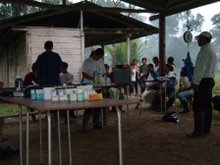There is no easy answer to the debates over where pro-poor development funds should go. As part of the whole paradigm shift we keep referring to, I think every field has to redefine its priorities. Biotech was the topic last week, and one of the controversies surrounding pro-poor biotechnology is the question of whether the vast amount of funding required to develop a new diagnostic, a new vaccine or a new drug is really worth it. Rich countries can argue that drugs already developed are very poorly distributed. Why fuel new innovations that will only widen the gap?
While committees concern themselves with that, paradigm shifters in the field have showed some promising advances, including new vaccines and low-cost treatments that are showing promise in advanced-level trials (anti-malaria vaccine, paromomycin treatment for kala azar). In a
New York Times article posted by Dr. Shahi awhile ago, Tina Rosenberg points out that vaccines have only been around for 20 years. In 20 years, they've made an enormous difference in a child's ability to survive the first five years of life! Who would have thought that such a labor-intensive project, which requires hunting people down in all corners of the world one by one, could be so successful? Who could have predicted that wars would be halted for vaccination campaigns? And yet it happened, and it changed everything.
Another example: The human genome was discovered two years ahead of time, and well under budget. According to one account I recently read, these unexpected outcomes were largely attributed to competitive cooperation among investigators. Again, it would seem impossible to unravel something as complicated as the human genome ahead of schedule simply because someone wanted to beat everyone else to it. And to do it more cheaply than expected, to boot. But that also happened, and it changed everything.
But we seem to forget history. Or maybe we're unaware that we're the ones making it. It's ironic, but one of crucial ways of achieving a paradigm shift is, I think, examining history in an attempt to understand just how we got to where we are now. There's an astonishingly accurate (and somewhat grim) picture of human nature buried in there, and confronting it proactively may provide some rationale, motivation, and clues to shifting that paradigm.
To learn more about biotech's role in global health, check out this article on the ten most promising biotechnologies for human development.
Subscribe to:
Post Comments (Atom)





3 comments:
Farah,
Thanks for posting that link. It was certainly very interesting reading about the various ways biotech is working in the health sector. The human genome discovery is really a testament at how biotechnology is always taking new and surprising twists and turns. It's a very exciting time that we are living in.
The same group that did the work on biotech for global health presented last week on nanotechnology for global health at the Woodrow Wilson Center: http://www.wilsoncenter.org/index.cfm?topic_id=116811&fuseaction=topics.event&event_id=216016http://www.wilsoncenter.org/index.cfm?topic_id=116811&fuseaction=topics.event&event_id=216016
They have the full video online. Pretty interesting stuff.
You raise a great point about expanding the innovation/technology gap. One thing that is different now is the ecosystem for health technologies in emerging regions is developing much faster now than ever before. For example clinical trials are growing rapidly overseas , see this great graphic on that:
http://www.mghproto.com/issues/2007_winter/infographic.html
Lots of countries are are developing their ability to develop biotech products and hopefully some of that will spark innovation for neglected diseases (http://www.scidev.net/ms/naturebiotech/). And finally the pharmaceutical market has strong growth in non-traditional markets. We can only hope there will be a spill over effect to help the poorest of the poor.
farah,
i found this today researching something else, and thought of you:
breast milk rice!
Post a Comment